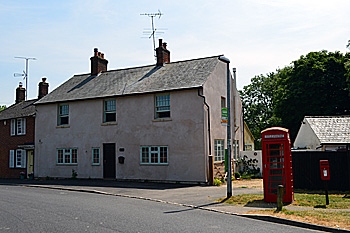Eggington Post Office
![The Post Office in 1965 [X351/30]](/CommunityHistories/Eggington/EggingtonImages/The Post Office in 1965 [X351-30].jpg)
The Post Office in 1965 [X351/30]
Sadly, Eggington no longer has a shop or post office. The Bedfordshire Historic Environment Record [HER] contains information on the county’s historic buildings and landscapes and summaries of each entry can now be found online as part of the Heritage Gateway website. The entry for the former post office [HER 6631] states that it is a 19th century building built of whitewashed brick and comprising two storeys beneath a Welsh slate roof.
The Rating and Valuation Act 1925 specified that every building and piece of land in the country was to be assessed to determine its rateable value. The valuer visiting the property [DV1/C174/87] found that it was owned and occupied by Alfred Leach and was a post office and “mostly a sweet shop”.
There was a living room, a kitchen and a room used as a barn on the ground floor as well as the shop. Upstairs were three bedrooms and a “room used for lumber”. A brick and slate store and washhouse stood outside.
There were also some farm buildings. These comprised: a weather-boarded and corrugated iron hen house; a weather-boarded and corrugated iron coal house in poor condition; a weather-boarded and thatched stable (“old – bad condition”); a weather-boarded and corrugated iron store (“old”); two pigsties (“neglect”); a corrugated iron shed used as a hay store and with an open traphouse adjoining. Leach also had an orchard extending to a third of an acre.
Directories for Bedfordshire were not published every year but every few years from the early to mid 19th century until 1940. Directories give the following post masters and post mistresses in Eggington:
- 1864, 1869, 1877, 1885, 1890, 1894: David Stevens;
- 1898, 1903, 1906, 1910, 1914, 1920, 1924, 1928, 1931: Alfred Leach;
- 1936, 1940: Mrs. Sarah Leach.
Eggington Women’s Institute scrapbook, compiled in 1965, has an entry for the post office and shop written by the owner [X351/30] which reads as follows: “Eggington has only one shop. It is owned by Mr. and Mrs. Bowerman and everything is sold there from a comprehensive supply of groceries to a collar stud, not forgetting the pint bottles of milk which Mr. Bowerman delivers daily and the local papers which come four times a week”.
“The shop has been in existence for about 200 years. It was once part of a row of cottages and more cottages stood on the ground at the back. Gradually as the premises have changed hands the shop has been enlarged and now the whole row is replaced by the one building of shop and house. The cottages in the garden have disappeared although where one of them once stood there still remains an oak beamed building with a divided door, mute evidence of its use in the past as a stable. When the present owners took over the shop they discovered wooden pegs in the wall on which the horses’ harness used to hang”.
“The character of the village has altered over the years, the war brought evacuees, some of whom married and settled in Eggington. Council houses were built and recently a new estate of bungalows and various other dwellings have been added to the existing property. This has meant a change in the type of trade done by the shop and to meet the needs of customers it has been modernised”.
“The premises also include a sub-post office and in 1962 Mr. Bowerman built a new shop on the side of the building [now a two storey extension rather than a single storey] and at the same time extended and modernized the living quarters”.
“No longer is the work done by the people of the village confined to the local farms. Many travel to Luton and Dunstable each day and some even work in Saint Albans and London. In fact the village has become a fashionable place to live. Customers now have many areas to choose from for their shopping ands they have buses and cars to get there. Competition is keen and so is the price war. The village shopkeeper has to keep his prices as low as possible while at the same time his profit has to be enough to enable him to live. This is sometimes very difficult with the limited population of the village and very little passing trade. It is only by giving individual personal service that the small traders can compete and in a close-knit community like a village this service is especially valuable. A shopkeeper who will deliver anything from a pin to a postage stamp and has even been known to lend a pound to the financially embarrassed, is a friend indeed, and this is what helps to keep the atmosphere of less harassed days. Customers come to the shop to buy a few things and while they are there they meet their neighbours and have a chat and we like to think that they maybe also discover that they got just as good or better value and service in their village shop as in any shop in town”.

The former post office July 2013